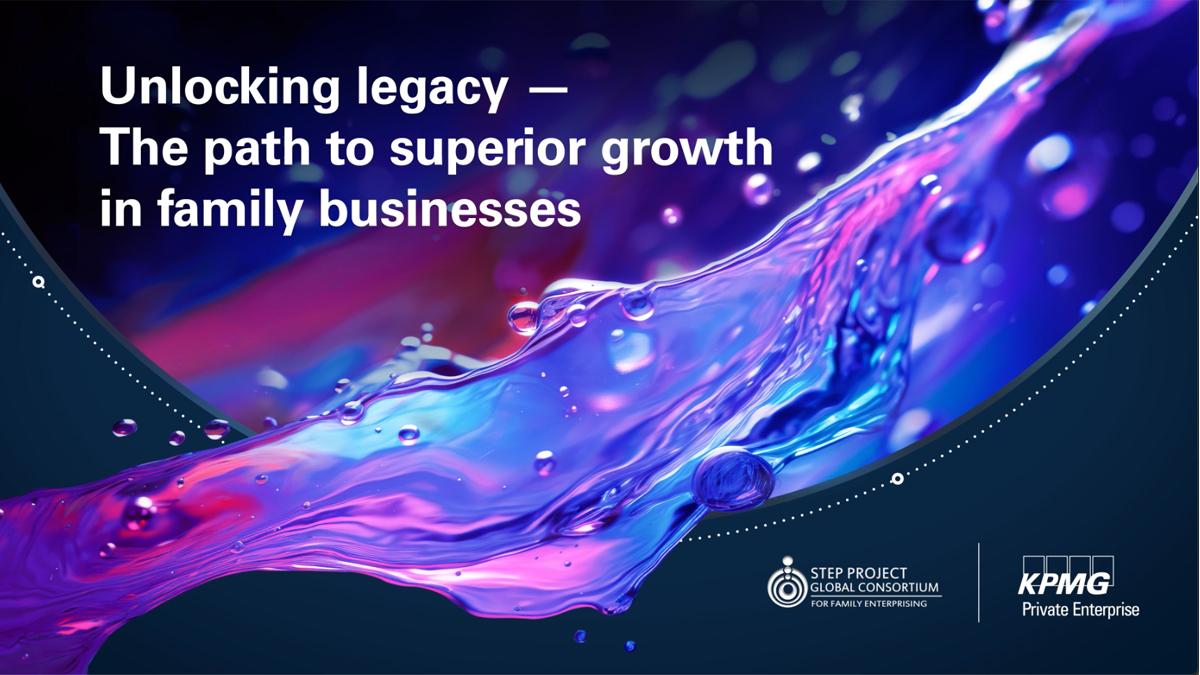
Successful family businesses harness tradition, experience, and innovation to achieve a new dynamic form of legacy
The Global Family Business report from KPMG Private Enterprise and the STEP Project Global Consortium reveals how some successful business families adopt a future-centric view of legacy that binds generations together, creating dynamic legacies that adhere with tradition while simultaneously embracing innovation. The report provides insights that reveal many business families are overcoming the ‘legacy paradox’ — the trade-off between being a source of identity and inspiration versus a liability if so entrenched in tradition it stands in the way of innovation and change.
The report brings together personal insights from the experiences of top family business leaders combined with data on the impact of family legacies on their business performance gathered from 2,683 family businesses across 80 countries, territories, and regions – including 114 respondents from Saudi Arabia. The survey data, which uses both qualitative and quantitative research, revealed that 78 percent of respondents in Saudi Arabia reported strong incorporation of legacy into their family business with the same cohort also reporting high sustainability scores, and a 77 percent reported a strong business performance — a powerful combination for the success of the business and the family today and for generations to come, and a reminder that legacy alone may be insufficient.
The annual report reinforces the importance of transgenerational entrepreneurship as a key driver of sustained performance in family businesses, with legacy alone insufficient to guarantee long-term progress from generation to generation. The report advocates that legacy is a process, not a final outcome, with the source of legacy originating from many different factors. Legacies are often amplified by transgenerational entrepreneurship among younger generations who compel their predecessors to communicate openly about what matters to them and to reinforce their business legacies and bridge what can sometimes appear as a generational divide.
The report emphasizes how important it is for family businesses to embrace their legacy, as it may be key to future successes: share the essence of your legacy with the family and executive team, and finally, give the family business’s subsequent generation the freedom to create their own legacy.
Fuad Chapra, Head of Private Enterprise & Family Business at KPMG in Saudi Arabia KPMG stated: “Differing perspectives and priorities can shape how different generations perceive the importance of their legacy and the strategies they employ to build and sustain it. These generational differences can also enrich the family business’s legacy by incorporating diverse perspectives and approaches that reflect the evolving dynamics of the business and broader society.”
“And with the increased focus on environmental, social and governance (ESG) priorities across the world, younger generations will likely be more concerned with the social and entrepreneurial legacies of their family businesses versus older generations who may continue to place more value on material legacies and the family bloodline. History doesn’t necessarily repeat, but it rhymes. It is imperative for founders to establish the ‘beat’ for subsequent generations to follow,” Chapra added.
The report takes a closer look at the true essence of legacy in today’s world and provides a ‘future-centric’ perspective where tradition and innovation co-exist and considers where change must be embraced for the business to remain resilient, competitive, and relevant. The report confirms that legacy may need to focus less on the past and be treated instead as a crucial building block for the future because of the positive contribution it makes to business performance and environmental, social, employee and supplier sustainability.
Differing perspectives and priorities can shape how different generations perceive the importance of their legacy and the strategies they employ to build and sustain it. These generational differences can also enrich the family business’s legacy by incorporating diverse perspectives and approaches that reflect the evolving dynamics of the business and of broader society.
With ‘social legacy’ heralded as the strongest legacy component from our research findings, the message was clear and served as an undeniable call to action for family businesses to harness their natural instincts to generate ‘sustained performance’ and develop a ‘dynamic legacy.’
The study indicates that while regional similarities exist, data points vary across regions due to the influence of transgenerational entrepreneurship. This supports the notion that legacy alone will likely not suffice — legacies should become dynamic to help maximize business outcomes.

Fuad Chapra, Head of
Private Enterprise & Family Business at KPMG in Saudi Arabia KPMG








